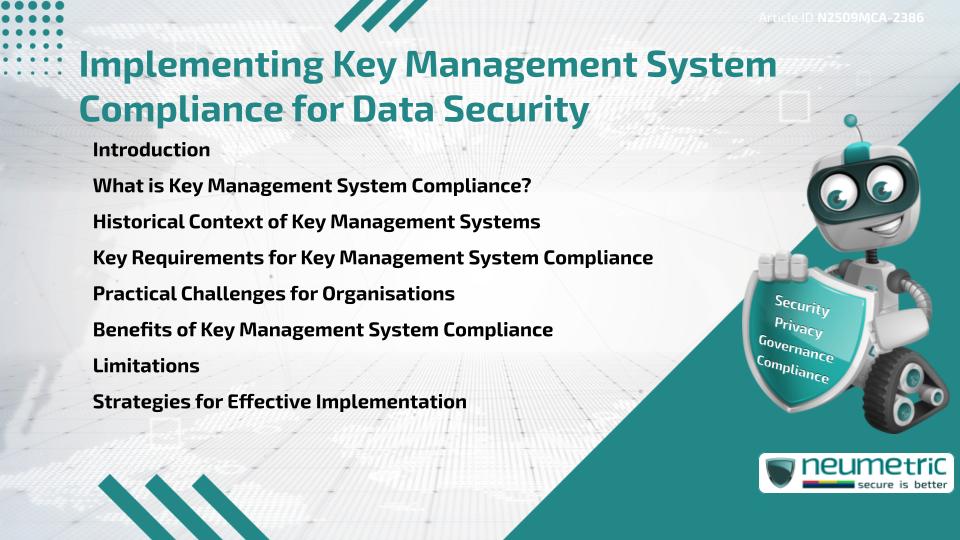Table of Contents
ToggleIntroduction
Key Management System Compliance is a Critical part of Enterprise Data Security. As organisations increasingly depend on Encryption to protect Sensitive Information, secure Handling of Cryptographic Keys has become essential. Compliance ensures that Keys are generated, stored & retired according to recognised Standards, reducing Risks of Breaches, Fraud & Regulatory Penalties.
What is Key Management System Compliance?
Key Management System Compliance refers to aligning Organisational Practices with Frameworks such as NIST, ISO 27001 & PCI DSS for managing Cryptographic Keys. It requires strict control over Key generation, distribution, usage, storage & destruction. Compliance demonstrates Accountability & Ensures that Encryption truly protects the data it is meant to Safeguard.
Historical Context of Key Management Systems
Early Encryption methods often failed due to poor Key Management Practices, such as sharing Keys in unsecured channels or reusing weak Keys. As Industries like Finance & Healthcare adopted Digital Systems, Regulators mandated stronger Controls. Today, Global Frameworks emphasise robust Key lifecycle Management, making Compliance an Integral part of Security Governance.
Key Requirements for Key Management System Compliance
Enterprises must implement Controls across the entire lifecycle of Keys:
- Key Generation: Use Secure methods & randomisation for Cryptographic strength.
- Key Storage: Store Keys in Hardware Security Modules [HSMs] or Encrypted Vaults.
- Access Control: Restrict access using Least Privilege & Multi-factor Authentication.
- Key Rotation: Regularly rotate Keys to reduce exposure.
- Key Retirement: Revoke & Destroy unused or expired Keys securely.
- Audit Logging: Maintain detailed Logs of Key usage & changes for Compliance.
Practical Challenges for Organisations
Achieving Key Management System Compliance can be Resource intensive. Legacy Systems may not support modern Encryption Standards. Integrating HSMs or Centralised Vaults across Hybrid Environments can be complex. Smaller organisations may lack In-house Expertise to design & maintain Compliant Systems, leading to reliance on Third Party Providers.
Benefits of Key Management System Compliance
Despite these challenges, Compliance delivers significant advantages:
- Stronger Data Protection against Breaches & Insider Threats
- Easier alignment with Regulations such as PCI DSS, HIPAA & GDPR
- Improved Customer & Regulator trust through demonstrable Governance
- Reduced Risk of costly Penalties & Reputational harm
- Enhanced Resilience in Multi-cloud & Hybrid Environments
Limitations
Some argue that Key Management Systems can introduce single points of failure if not designed redundantly. High implementation costs & complex integrations may deter smaller organisations. Additionally, Compliance does not guarantee absolute Security, it reduces Risks but cannot address all Threats.
Strategies for Effective Implementation
To strengthen Compliance, organisations should:
- Conduct Risk Assessments to identify Gaps in current Key Management Practices
- Deploy HSMs or Secure Key Vaults for Sensitive Environments
- Automate Key Rotation & Monitoring where possible
- Train Staff on Policies & Regulatory obligations
- Reference Global Governance Resources such as OECD Privacy guidelines, World Bank insights & ENISA
Takeaways
Key Management System Compliance is essential for ensuring that Encryption truly secures Sensitive Data. By implementing Lifecycle Controls, automating processes & aligning with recognised Standards, organisations can strengthen Governance, reduce Risks & Build Long-term Resilience.
FAQ
What is Key Management System Compliance?
It is the practice of aligning Key Handling processes with Standards such as NIST, ISO 27001 & PCI DSS.
Why is it important for Data Security?
It ensures Encryption Keys are protected, reducing Risks of Breaches & Regulatory Penalties.
What challenges do Organisations face?
Challenges include Legacy Systems, High Costs & Lack of Expertise.
What are the main Compliance Requirements?
Key Generation, Secure Storage, Access Controls, Rotation, Retirement & Audit Logging.
Does Compliance guarantee full Security?
No, but it greatly reduces Risks & Strengthens trust with Regulators & Customers.
References
- NIST CyberSecurity Framework
- ISO 27001 – Information Security
- PCI Security Standards
- OECD Privacy Guidelines
- ENISA – European Union Agency for CyberSecurity
Need help for Security, Privacy, Governance & VAPT?
Neumetric provides organisations the necessary help to achieve their CyberSecurity, Compliance, Governance, Privacy, Certifications & Pentesting needs.
Organisations & Businesses, specifically those which provide SaaS & AI Solutions in the Fintech, BFSI & other Regulated sectors, usually need a CyberSecurity Partner for meeting & maintaining the ongoing Security & Privacy needs & requirements of their Enterprise Clients & Privacy conscious Customers.
SOC 2, ISO 27001, ISO 42001, NIST, HIPAA, HECVAT, EU GDPR are some of the Frameworks that are served by Fusion – a SaaS, multimodular, multitenant, centralised, automated, CyberSecurity & Compliance Management System.
Neumetric also provides Expert Services for technical Security which covers VAPT for Web Applications, APIs, iOS & Android Mobile Apps, Security Testing for AWS & other Cloud Environments & Cloud Infrastructure & other similar scopes.
Reach out to us by Email or filling out the Contact Form…


